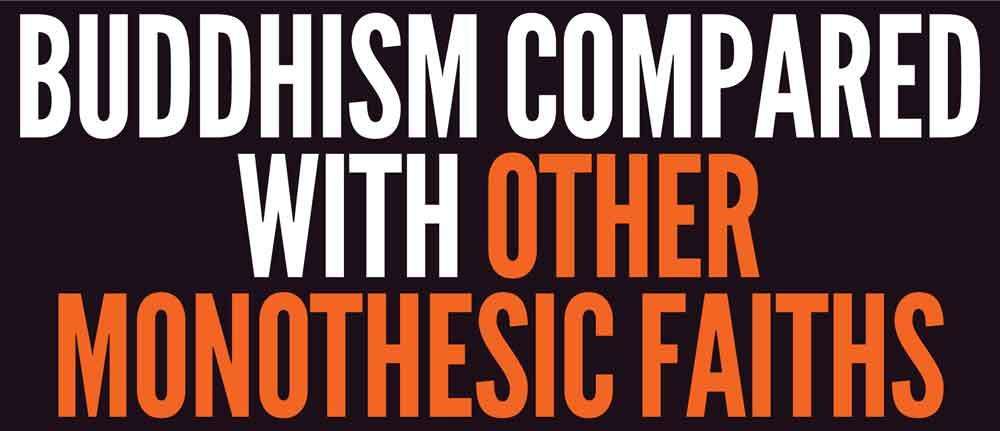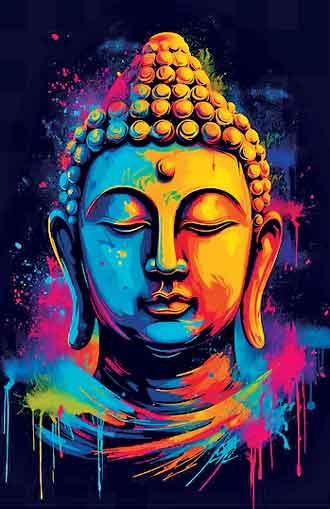Reply To:
Name - Reply Comment

 Buddhism originated in India over 2500 years ago. It is a nontheistic faith founded by Siddhartha Gautama, also known as the Buddha. Buddha was a human being. He was born and lived as a human being but was an extraordinary human being who never arrogated to himself divinity. The Buddha was a unique religious leader who encouraged critical assessment of his teaching. He encouraged free vigorous investigation into the truths of the teachings he propounded. His teachings, (enunciated in many of his discourses) have shaped many civilisations and countless lives to this day. Buddhism has endured over two thousand five hundred years without a centralised authority. It is a religion that shows a sense of meaning and a higher purpose in life.
Buddhism originated in India over 2500 years ago. It is a nontheistic faith founded by Siddhartha Gautama, also known as the Buddha. Buddha was a human being. He was born and lived as a human being but was an extraordinary human being who never arrogated to himself divinity. The Buddha was a unique religious leader who encouraged critical assessment of his teaching. He encouraged free vigorous investigation into the truths of the teachings he propounded. His teachings, (enunciated in many of his discourses) have shaped many civilisations and countless lives to this day. Buddhism has endured over two thousand five hundred years without a centralised authority. It is a religion that shows a sense of meaning and a higher purpose in life.
 Since its inception, Buddhism has been central to spiritual and cultural social life. It has brought immense psychological and spiritual solace and relief to people who are overwhelmed by suffering and challenges in their lives.
Since its inception, Buddhism has been central to spiritual and cultural social life. It has brought immense psychological and spiritual solace and relief to people who are overwhelmed by suffering and challenges in their lives.
Buddhism is unique among world religions because it does not fit the narrow definition of a typical religion, as its teachings contain many philosophical and scientific elements, distinct from its strictly religious ritual and devotional aspects. It emphasizes self-reliance, self- discipline, and individual efforts rather than dependence on an external agency.
Buddhism is based on human experience and potential. It is essentially a practical doctrine. It addresses the fundamental question of human suffering. Buddha preached that it is because of ignorance (avijja) that all beings experience never-ending frustration and suffering in their lives. A careful comparison between Buddhism, Christianity and other monotheistic religions demonstrates that there are not only distinct doctrinal incompatibilities but also compelling similarities as certain aspects of Buddhism tend to overlap and align with other faiths.
Buddha like many other great spiritual teachers offered a path toward individual enlightenment and deliverance from suffering, Similarly, Christian and other monotheistic spiritual leaders have identified the same path of deliverance in different terminological terms as redemption or salvation. Christianity and other monotheistic faiths teach that salvation or redemption is achieved through faith. In contrast, Buddhism emphasizes individual effort and wisdom to achieve enlightenment.
Since its inception, Buddhism has been central to spiritual and cultural social life. It has brought immense psychological and spiritual solace and relief to people who are overwhelmed by suffering and challenges in their lives
Further, Christianity teaches that God became in the person of Jesus Christ who sacrificed himself on the cross to forgive people of their sins. Buddha pointed the way, whereas, Jesus said he was the way.
The spirit of compassion is as central to Buddhism as love is to Christianity and other faiths. Buddhism is not an exclusive religion as it is possible to practice its moral and ethical principles while still being a Christian or by a person belonging to different religious traditions without losing his religious identity.
Most importantly, the concept of a Creator God that looms large in Christianity and many other monotheistic religions is absent in Buddhism. They attribute the creation of the world to an almighty God. They argue that life had a beginning in the infinite past whereas Buddhism states it is without beginning, and inconceivable. Buddha never admitted the existence of a creator whether in the form of a force or a being.
The spirit of compassion is as central to Buddhism as love is to Christianity and other faiths. Buddhism is not an exclusive religion as it is possible to practice its moral and ethical principles while still being a Christian or by a person belonging to different religious traditions without losing his religious identity
Meditation and mindfulness are at the heart of Buddhism whereas Christianity and other faiths place greater stress on prayer. Buddhism places greater emphasis on personal effort whileChristianity and other monotheistic religions lay greater emphasis on grace.
Christianity and other monotheistic religions deny rebirth after a persons death. Buddha expounded the doctrine of Dependent Origination (Pattica samuppada) his teaching on rebirth. Dependent Origination is an account of the sequence of causes that cause the arising of suffering and the reverse order of the cessation of suffering. In other words, it is a principle of conditionality, relativity and interdependence which is of universal applicability, which Christians and other spiritual leaders reject on the basis that they have one life and one chance.
Happiness and suffering that people undergo through their present lifetime, are the results of their actions committed in the past life and most life experiences result from previous actions. In brief, it is one’s actions that determine ones future experiences without any intervention of a God
Buddhism does not demand unquestionable blind faith from its followers whereas Christianity and other monotheist religions insist on resolute and unwavering faith from its adherents.
Further, Buddhism’s whole central vision, unlike many other religions, can be concisely summed up in the following stanza “sabba papassaakaranm kusklassa upasamppada scitta pariyodanam etam buddha sasanam”, which means – “ avoidance of all evil, cultivation of good and cleansing ones mind of all impurities”.
The basis of Christianity and other monotheistic religions is the Supreme almighty God, but Buddhism gives pride of place to mind. According to it, the mind is the theme and the forerunner of everything. “All mental phenomena have their forerunner, they have mind as their chief, they are mind-made and all the deeds are led by the mind, created by the mind. If one speaks or acts with an evil mind, suffering (dukkha) follows him just as the wheel follows the hoof prints of the ox, as surely as ones shadow. Similarly, if one speaks or acts with a wicked mind, suffering follows a person as the wheel follows the hoof of the draught ox. We become what we think (Dhammapada). In other words, our life is shaped by our minds.
One of the mainstays of every religion is some form of a doctrine of consequences for moral transgression and failure. Christianity and other monotheistic faiths have punishment for moral failure or transgressions. They teach that God will judge individuals based on their moral conduct with the potential for forgiveness. They primarily focus on the concept of divine judgement where God determines ones fate based on his actions. We are what we were willed to be by an almighty Creator God. Our destinies rest entirely in his hands. Our destiny is preordained by him. But Buddhism does not speak of such an almighty God who will reward or punish moral transgressions. It focuses on the concept of kamma where every action good or bad creates a corresponding reaction. It is an immutable law of cause and effect, we cannot avoid its consequences. For every action, there is a corresponding reaction. It speaks of the principle of cause and effect (kamma) “ As you sow, so shall you reap” Karma means what we do, we become. Buddhism teaches that human beings are responsible for their actions. The consequences of our actions rebound back on us either in the life in which actions are committed, or in some future life. The underlying intention behind every action determines the nature of its results. The quality of future births depends on the moral quality of our actions now, Happiness and suffering that people undergo through their present lifetime, are the results of their actions committed in the past life and most life experiences result from previous actions. In brief, it is one’s actions that determine ones future experiences without any intervention of a God.
The five precepts in Buddhism, known as Pancha Sila in Pali, constitute the minimal standard of morality that Buddhists are expected to observe in their day-to-day lives. They represent Buddhisms core values which can be followed not only by Buddhists but also by people of other religions. These precepts are normative, they are analogous to the spirit of the Ten Commandments of Christianity and the moral codes of many other monotheistic faiths.
Moral values are standards by which we distinguish between right and wrong, good and evil. Morality is concerned with what is right or wrong in human conduct. Buddhism upholds lofty and demanding moral and ethical values in many of its scriptures and codes of precepts. Some of the Buddhist ethical and moral principles such as prohibition of murdering, stealing, adultery, uttering falsehood etc. are found in many of the monotheistic religions. The core principles of Buddhism focuses on how to live a virtuous life by practising self-control and letting off destructive emotions like anger and other unwholesome forces. The code of morality of Buddhism that Buddha propounded thousands of years ago offers timeless wisdom that resonates just as much today.
Buddhism teaches a doctrine of Anatta, which means that there is no everlasting or abiding essence in living beings. Buddhists believe that life is full of suffering, it is by putting an end to rebirth that man can end the cycle of suffering. Buddhism is a non-theistic religion also considered a philosophy.
Buddha was not a saviour who could save others from suffering and misery. He exhorted his adherents to depend on themselves for deliverance. He declared no external agency can purify or defile others and that there is no Supreme God that can control the destinies of human beings, as enunciated in Christianity and other monotheistic teachings. Buddha said “To depend on others for salvation is negative. But to depend on oneself is positive”. “Be ye isles unto yourselves, be ye a refuge unto yourselves, seek no refuge in others”. Unlike other monotheistic religions, these significant words reveal the importance of self-exertion to achieve deliverance from suffering without depending on an external agency and the futility of seeking redemption through benign saviours. Furthermore, like many other monotheistic religious values, Buddhist moral and ethical values have always been important for interfaith harmony, peace and progress.